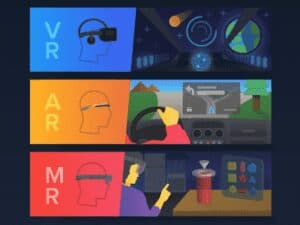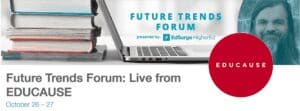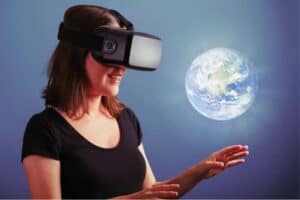The annual Educause conference is a fast-paced week that brings together over 7000 EdTech and IT professionals. This year we meet in Anaheim, California. Future trends in learning is one of the themes at Educause and here is what’s on our schedule.
It is all About VR, AR and MR on Tuesday
 Tuesday, we are excited to lead a “Virtual Reality and the Future of Learning” Preconference Seminar. Here’s the description:
Tuesday, we are excited to lead a “Virtual Reality and the Future of Learning” Preconference Seminar. Here’s the description:
This is an experiential seminar that explores the learning opportunities that will come about in the development of virtual reality devices, platforms, and experiences. We will highlight and review a number of projects that can be implemented in the classroom, makerspaces, innovation centers, and VR labs. Immersive interactive experiences offered through VR create compelling learning resources and environments. As we move into this world, it will require innovation in pedagogy, learning space design, and institutional culture.
Wednesday check the Futurist Talk with Bryan Alexander

If you’re not coming to Educause, catch us and some of the leading voices in education and technology on Wednesday online. We are talking with our dear friend Bryan Alexander and participating in the Future Trends Forum: Live from Educause. Bryan has two sessions on Wednesday and Thursday with an amazing lineup of guests including John O’Brien, the President of Educause, Cliff Lynch and Casey Green.
Bryan, a deeply insightful education futurist, is also leading a seminar on Tuesday titled “Future Trends in Technology and Education: Building Foresight Capacity in Your Organization”. If you’re thinking about future trends in learning and how our institutions need to change, this is the place to be.
Thursday we meet Sugata Mitra again and talk Visual Culture
 Thursday morning, we look forward to meeting Sugata Mitra again as he delivers the keynote on the Future of Learning. Here’s his description of his talk:
Thursday morning, we look forward to meeting Sugata Mitra again as he delivers the keynote on the Future of Learning. Here’s his description of his talk:
Sugata Mitra will take us through the origins of schooling as we know it, to the dematerialization of institutions as we know them. Thirteen years of experiments in children’s education provide a series of startling results—children can self-organize their own learning, they can achieve educational objectives on their own, and they can read by themselves. Finally, the most startling result: groups of children with access to the Internet can learn anything by themselves. Studies in the slums of India; the villages of India and Cambodia; poor schools in Chile, Argentina, Uruguay, the United States, and Italy; the schools of Gateshead; and the rich international schools of Washington and Hong Kong produced experimental results that show a strange new future for learning. Using the TED Prize, Mitra has now built seven “Schools in the Cloud,” glimpses of which he will provide.
On Thursday at 1:30pm we are leading a session on “Developing Visual Literacy Strategies for Higher Education in the 21st Century”:
This session will explore the future of higher education through the rapid evolution of visual culture, which is reshaping how we access and perceive information and experience the world. Everything from scientific data to the disciplines in the humanities is increasingly visual and interactive. This session will examine the development of a new framework for visual literacy in higher education.
Time for a drink and a ride on Friday
Educause is a incredible ride through the current landscape in education and future trends in learning. From VR to personalized learning, micro-credentials, open source, cloud computing, and a host of innovations, it’s all here. We look forward to seeing old friends and making new ones. It is a week where many project ideas get started.
Finally, we hope to end the week at the Disney Haunted Mansion to check out the thrills and see their latest technology advances. Their Magic Band is one of the most successful wearables around. Are they getting ready to do VR?
Until then, there’s lots of work to finalize, print and sort the materials for our seminar. Stay tuned and follow us on twitter @DigitalBodies and @mayaig and @emorycraig for our impressions during the week.
Maya Georgieva is an EdTech and XR strategist, futurist and speaker with more than 15 years of experience in higher education and global education policy. Her most recent work focuses on innovation, VR/AR and Immersive storytelling, design and digital strategy. Maya actively writes and speaks on the topics of innovation, immersive storytelling and the future of education and consults organizations and startups in this space.



